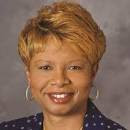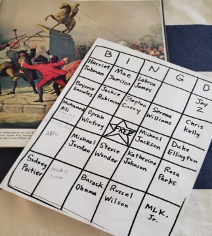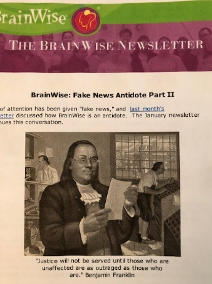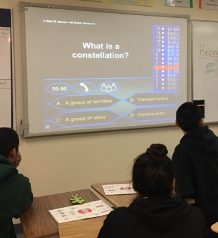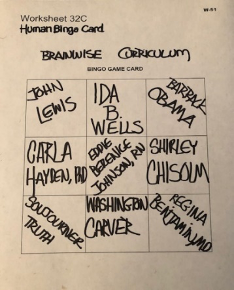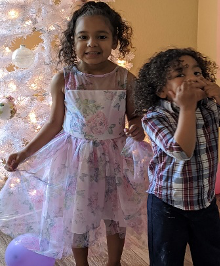BrainWise and American History
Posted On: August 10, 2020|
Many individuals and organizations are primed right now to address inequalities which still exist in the United States. This newsletter shares how you can use BrainWise to create lessons and activities that have students utilize the 10 Wise Ways to learn more expansive and truthful histories and to discuss the choices and decisions made by Americans and other world citizens.
“Our Race Shapes Our Realities” was the title of a panel presentation led by six leaders who represented diverse ethnic groups. Moderated by Karen McNeil Miller, Ph.D., the CEO of the Colorado Health Foundation, 500 people signed up for the Zoom discussion which I, too, attended. An important take-away for me was that the panelists were unanimous in their agreement that to change inequalities we need to educate our youth and adult citizens about the truthful history of race in the United States.
The consensus that truthful history must be taught dovetailed with a conversation I had had recently with school psychologist Karyn Singley Blair and her husband, Peter, a history teacher at Aurora Central High School. Karyn is a master BrainWise instructor who has taught the 10 Wise Ways to special needs students for more than fifteen years (see 2017 and 2020 newsletter articles on Karyn.)
Peter and Karyn use games such as BINGO, Jeopardy! and Who Wants to be a Millionaire? as classroom teaching tools. They have found the game format motivates students to learn and get involved with their classmates, even remotely.
We were discussing how to use online games to teach BrainWise in the Covid-19 milieu. Peter mentioned that he had used BINGO during last year’s African American History month to reinforce identification of important black leaders and citizens in American History.
Coincidentally, BrainWise already has a Bingo Game that uses names to teach and reinforce Wise Ways. (Link to BrainWise Bingo History Lesson) The lessons can be taught using Smartboards and similar education electronics, paper and pencil, or a hybrid version.
The Black Leaders’ Lesson not only teaches about these important leaders, but also teaches ever-expanding perspectives that open conversations about discrimination, including invidious acts by those in authority. The 10 Wise Ways can be used to analyze historical events that address the multiple facets and complicated motivation surrounding oppression.
Picture 1 shows one of Peter’s Bingo cards. Notice behind the card is an image of a British statue being torn down by American revolutionaries. Peter inserted this to show the lesson he teaches about the similarities between the behaviors of early American colonists and the behaviors of today’s protesters. It is another example of using history for teaching and applying the 10 Wise Ways!
Picture 2 is the cover of the BrainWise newsletter article that illustrates the behaviors of leaders of the American Revolution and their parallel with behaviors of protesters today. It also reviews the power of intentionally implanted disinformation. These stories spark discussions not only about fact vs. opinions, but also about asking questions, identifying choices, considering consequences, taking other people’s points of view, and showing empathy.
Picture 3 shows Karyn’s students answering BrainWise questions during an online game. The picture was taken pre-Covid and students can also play virtually. Creative teachers know how to keep technology simple for many students who have no or minimal access to electronic devices. BINGO, Jeopardy! and Who Wants to Be a Millionaire? are games that can be played with or without devices.
Picture 4 is a BINGO worksheet from the curriculum. It is a shorter version of the game with nine squares for names of people, things, or events. BrainWise BINGO can engage students from designing the lesson to teaching it. The lesson can be extended to include all historical events and any social and health topic.
|
|
|
|
Dr. Miller raised an issue seldom discussed outside of the Black culture. The first question she asked the participants was “When did you have The Conversation with your children?” (Her question was not “Did you have The Conversation with your children?” but “When” did you have it?)
She answered it herself by sharing that she talked with her young Black son about how to act in the gated, all-white community where they had just moved. She introduced him to key community members, from HOA leaders to staff and security detail. Her fear has increased now that he is a 6-foot-tall young adult Black male.
“The Conversation” is a matter of life or death. Careful behavior does not guarantee safety when the color of your skin raises red flags and fears that trigger Lizard Brain reactions.
|
|
|
Tiffany Tate Aragon, a BrainWise graduate and now the parent of a six-year-old and three-year-old, is doing what she hopes will eliminate the need to ask this question. Tiffany pulled out her BrainWise notes from high school after she had her first child. She says the information she learned in the course not only helped her, she is teaching her children about Lizard Brain reactions and skills to stop and think. She wants them to learn the 10 Wise Ways. She also wants their friends and everyone who interacts with them to also know how to stop and think.
Tiffany’s expertise is social media. She is working with the BrainWise team and is determined to get the 10 Wise Ways out to other parents. If she has her way, she will make “The Conversation” ancient history.
|
|
|
|
The dedicated teachers, counselors and health professionals who teach BrainWise seldom or never find out the impact they have had on their students. Marsha Harman taught Tiffany BrainWise in 1999 (link to articles on Tiffany). Karyn and Marsha have taught BrainWise to hundreds of students. They and the Brainwise community of instructors have had a positive impact on multiple generations of families who are teaching the skills to others.
|
